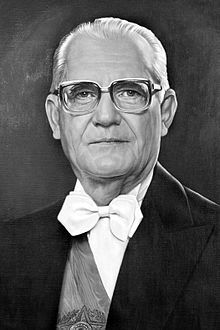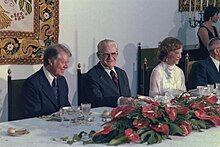User:BobaFentanyl/sandbox/Israeli Prime Ministers
Ernesto Geisel | |
|---|---|
 | |
| 29th President of Brazil | |
| In office March 15, 1974 – March 14, 1979 | |
| Vice President | Adalberto Pereira dos Santos |
| Preceded by | Emílio Garrastazu Médici |
| Succeeded by | João Figueiredo |
| 13th President of Petrobras | |
| In office November 6, 1969 – July 6, 1973 | |
| Appointed by | Emílio Garrastazu Médici |
| Preceded by | Waldemar Cardoso |
| Succeeded by | Faria Lima |
| Justice of the Superior Military Court | |
| In office March 20, 1967 – October 27, 1969 | |
| Appointed by | Castelo Branco |
| Preceded by | Floriano de Lima Brayner |
| Succeeded by | Jurandyr de Bizarria Mamede |
| Chief Minister of the Military Cabinet | |
| In office April 15, 1964 – March 15, 1967 | |
| President | Castelo Branco |
| Preceded by | André Fernandes de Sousa |
| Succeeded by | Jaime Portela de Melo |
| In office August 25, 1961 – September 8, 1961 | |
| President | Ranieri Mazzilli |
| Preceded by | Pedro Geraldo de Almeida |
| Succeeded by | Amaury Kruel |
| Personal details | |
| Born | Ernesto Beckmann Geisel August 3, 1907 Bento Gonçalves, Rio Grande do Sul, Brazil |
| Died | September 12, 1996 (aged 89) Rio de Janeiro, Rio de Janeiro, Brazil |
| Cause of death | Cancer |
| Resting place | São João Batista Cemetery[citation needed] Rio de Janeiro, Brazil |
| Political party | ARENA (1974–1979) |
| Spouse | Lucy Markus (1939–1996; his death) |
| Children | Amália Orlando |
| Signature | |
| Military service | |
| Allegiance | |
| Branch/service | |
| Years of service | 1927–1969 |
| Rank | |
Presidency (1974-1979)
[edit]In 1973 President Emílio Garrastazu Médici selected Geisel to be his successor as the President. There had been intense behind-the-scenes maneuvering by the hard-liners against him and by the more moderate supporters of Castelo Branco for him. Fortunately for Geisel, his older brother, Orlando Geisel was the Minister of Army, and his close ally General João Baptista de Oliveira Figueiredo the chief of Médici's military staff.
At that time the President of Brazil was chosen by the military and then approved by the Congress in order to give an impression of democratic elections. Geisel ran as the candidate of the pro-military National Renewal Alliance Party (ARENA). For the first time during the era of military rule, the Brazilian Democratic Movement (MDB) actually put up a candidate in the person of longtime deputy Ulysses Guimarães. However, Guimarães knew that given ARENA's then-landslide majority in the Congress, Geisel's victory was a foregone conclusion. As expected, Geisel was elected by a vast majority (400-76, with 21 blank votes and six abstentions) and was inaugurated on March 15, 1974 for a five-year mandate.
Economy
[edit]During the Brazilian Miracle from 1968 to 1973 Brazilian economy had grown at a rate of more than 10% per year, the fastest in the world. But due to the oil shock crisis in 1974, development fell to 5–6% per year. Because much of the country's oil had to be imported, Brazil's foreign debt began to rise. This strategy was effective in promoting growth, but it also raised Brazil's import requirements markedly, increasing the already large current-account deficit. The current account was financed by running up the foreign debt. The expectation was that the combined effects of import substitution industrialization and export expansion eventually would bring about growing trade surpluses, allowing the service and repayment of the foreign debt.[citation needed]
President Geisel sought to maintain high economic growth rates, while dealing with the effects of the 1973 oil crisis. He maintained massive investments in infrastructure - highways, telecommunications, hydroelectric dams, mineral extraction, factories, and atomic energy. Fending off nationalist objections, he opened Brazil to oil prospecting by foreign firms for the first time since the early 1950s.[citation needed]
Relaxation of dictatorship
[edit]Geisel adopted a more moderate stance with regards to political opposition. Together with his Chief of Staff, Minister Golbery do Couto e Silva Geisel devised a plan of gradual, slow democratization that would eventually succeed despite all the threats and opposition from hard-liners. He replaced several regional commanders with trusted officers and labeled his political program abertura and distensão, meaning a gradual relaxation of authoritarian rule. It would be, in his words, "the maximum of development possible with the minimum of indispensable security."[citation needed]. In 1974 elections opposition won more votes than before. However, the torture of regime's left-wing and Communist opponents by DOI-CODI was still ongoing as demonstrated by the murder of Vladimir Herzog.
In 1977 and 1978 the Presidential succession issue caused further political confrontation with the hard-liners. Noting that Brazil was only a "relative democracy," Geisel attempted in April 1977 to restrain the growing strength of the opposition Brazilian Democratic Movement (MDB) party by creating an electoral college that elect the next President. In October he dismissed the far-right Minister of Army, General Sylvio Couto Coelho da Frota who had tried to become candidate for the next President.[1]
In 1978 Geisel had to deal with the first labor strikes since 1964 and electoral victories of the opposition MDB. In late December 1978 he announced the end of the oppressive Institutional Act 5, allowed exiled citizens to return, restored habeas corpus and political rights to politicians, repealed the extraordinary powers of President, and managed election of General João Figueiredo (1979–85) as his successor in March 1979.
In 2018, an unearthed CIA memorandum from April 11, 1974 sent by William Colby to U.S. Secretary of State Henry Kissinger details the summary executions of over 100 "subversives" which were personally authorized by Ernesto Geisel himself.[2]
Foreign policy
[edit]
In his 5 years of government, Geisel adopted a more pragmatic foreign policy. Despite being a conservative and deeply anti-communist, Geisel made significant overtures towards the communist bloc. Brazil established diplomatic relations with the People's Republic of China and socialist regimes of Angola and Mozambique, signaling a growing distance between Brasília and Washington. Although both countries remained allies, Geisel was keen to seek new alliances and, more importantly, new economic opportunities in other parts of the world, especially Africa and Asia.
Brazil shifted its foreign policy to meet its economic needs. "Responsible pragmatism" replaced strict alignment with the United States and a worldview based on ideological frontiers and blocs of nations. Because Brazil was 80% dependent on imported oil, Geisel shifted the country from a critical support of Israel to a more neutral stance on Middle Eastern affairs. Brazil moved closer to Latin America, Europe and Japan.
The 1975 agreement with West Germany to build nuclear reactors produced confrontation with the Carter administration, which also scolded the Geisel government for abusing human rights. Frustrated with what he saw as the highhandedness and lack of understanding of the Carter administration, Geisel renounced the military alliance with the United States in April 1977.[citation needed]
BobaFentanyl/sandbox/Israeli Prime Ministers | |
|---|---|
 | |
| 30th President of Brazil | |
| In office March 15, 1979 – March 14, 1985[3][4] | |
| Vice President | Aureliano Chaves |
| Preceded by | Ernesto Geisel |
| Succeeded by | José Sarney |
| Head of the National Intelligence Service | |
| In office March 15, 1974 – June 14, 1978 | |
| Appointed by | Ernesto Geisel |
| Preceded by | Carlos Alberto da Fontoura |
| Succeeded by | Otávio Aguiar de Medeiros |
| Chief Minister of the Military Cabinet | |
| In office October 30, 1969 – March 14, 1974 | |
| President | Emílio Médici |
| Preceded by | Jaime Portela de Melo |
| Succeeded by | Hugo de Abreu |
| Personal details | |
| Born | João Baptista de Oliveira Figueiredo January 15, 1918 Rio de Janeiro, Brazil |
| Died | December 24, 1999 (aged 81) Rio de Janeiro, Brazil |
| Resting place | São Francisco Xavier Cemetery Rio de Janeiro, Brazil |
| Political party | PDS (1979–85) ARENA (1978–79) |
| Spouse | Dulce Castro (1942–1999; his death) |
| Children | 2 |
| Alma mater | Military School of Realengo |
| Signature | |
| Military service | |
| Allegiance | |
| Branch/service | |
| Years of service | 1937–1979 |
| Rank | |
In 1974 he assumed the leadership of the National Intelligence Service of Brazil (March 15, 1974 – June 14, 1978), a Brazil's internal security agency. Picked by President Ernesto Geisel as his successor, Figueiredo campaigned vigorously, even though he could not possibly be defeated; the president was elected by a legislature dominated by the pro-military National Renewal Alliance Party. As expected, he won easily against the nominal opposition candidate, General Monteiro.
As president, he continued the gradual abertura (democratization) process instituted in 1974. An amnesty law, signed by Figueiredo on August 28, 1979, amnestied those convicted of "political or related" crimes between 1961 and 1978. In the early 1980s, the military regime could no longer effectively maintain the two-party system established in 1966. The Figueiredo administration dissolved the government-controlled National Renewal Alliance Party (ARENA) and allowed new parties to be formed. In 1981 the Congress enacted a law to restore direct elections of state governors. The general election of 1982 brought victory to ARENA's successor, the pro-government Democratic Social Party (43.22% of the vote), and to the opposition Brazilian Democratic Movement Party (42.96%).
The governorship of three major states, São Paulo, Rio de Janeiro and Minas Gerais, was won by the opposition. However, political developments were overshadowed by economic problems. As inflation and unemployment soared, the foreign debt reached massive proportions making Brazil the world's biggest debtor owing about US$90 billion to international lenders. The austerity program imposed by the government brought no signs of recovery for the Brazilian economy until the end of Figueiredo's term. The president had a heart attack and injuries from horse riding and took two prolonged leaves for health treatment in 1981 and 1983, but civilian vice president Antônio Aureliano Chaves de Mendonça did not enjoy major political power. The opposition vigorously struggled to pass a constitutional amendment that would allow direct popular Presidential elections in November 1984, but the proposal failed to win passage in the Congress. The opposition candidate Tancredo Neves succeeded Figueiredo when Congress held an election for the new President. He did not return to politics, lived away from the public attention and died on December 24, 1999. After his death President Fernando Henrique Cardoso declared three days of mourning.[5]
- ^ Get to Know a Brazilian – Ernesto Geisel
- ^ Phillips, Tom (May 11, 2018). "'Astonishing' CIA memo shows Brazil's ex-dictator authorized torture and executions". The Guardian. Retrieved August 27, 2018.
- ^ "Galery of presidents" (in Portuguese). Palácio do Planalto. Retrieved February 3, 2016.
- ^ "Governo Fernando Henrique Cardoso" (in Portuguese). Brasil Escola. Retrieved February 9, 2016.
- ^ Joao Figueiredo, military ruler who opened Brazil to democracy, dies at 81


